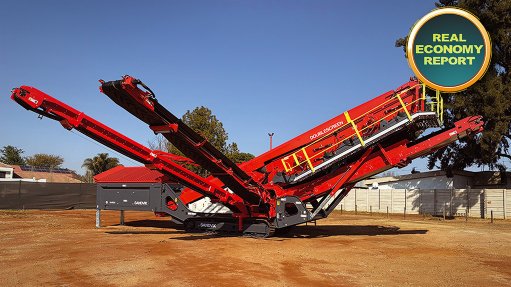Challenges, but also opportunities, abound to grow sustainable township businesses
A better understanding of the scale, challenges and business models of businesses in township economies can help to create better financing and policy support that will help township businesses to grow.
South Africa's township economies contribute 28% to national GDP, according to the South African Reserve Bank, and the informal sector provides employment for about 3.5-million people, North-West University PhD student and township entrepreneur Teboho Nthoana has pointed out, citing data published by Statistics South Africa.
"The majority of South Africa's population live in townships and my studies show that about 75% of people in townships tend to buy goods and services within townships. Shopping centres and retail stores are moving into townships to take advantage of the market present," he said during financial services firm PSG's Think Big series 'Building Sustainable Township Economies' webinar on November 26.
For many township businesses, the focus is hand to mouth, with a rare few businesses being able to invest in their business models.
This creates an opportunity for financing products specifically designed for township businesses to fill this gap, if the township economy were better understood.
"Often, businesses that have taken the time to understand the township economies are those that invest in township businesses, as knowing how these businesses operate and their potential allows them to design products and services suited to these businesses, giving them an advantage," he said.
Considering the numbers, township economies present a significant market that can be tapped and supported to grow and create jobs. A microfinancing investment ecosystem can be created to support township businesses and entrepreneurs.
A micro-investment ecosystem to support township entrepreneurs could take various forms, including microlending, crowdfunding platforms, peer-to-peer lending and venture capital.
Township entrepreneurs may struggle to produce security required for traditional loans and may struggle to produce documentation for all their transactions. But, until South Africa is able to build businesses that can contribute to the economy, grow and create jobs, it will face a challenge of unemployment, he said.
Therefore, understanding the market is the first step in designing suitable financial, legal and advisory products for township businesses. Once these businesses are able to grow, this will boost investor confidence further and broaden the knowledge of township economies and opportunities, Nthoana noted.
However, while promising, township businesses also face significant challenges. One of the key ways of supporting them is to ensure they have access to suitable and efficient infrastructure, including digital and physical utilities. A lack of adequate infrastructure creates barriers for township businesses.
"From a government point of view, bureaucracy and regulations can be streamlined and this can potentially be addressed through innovation, especially to support township entrepreneurs.
"Create an opportunity for these businesses to be seen, whether by investors or venture funds; to attract investment and grow is important," he said.
The context in which township businesses operate and the requirements of working in the areas where they are situated need to be better understood to create the required support to enable them to grow and support employment and development.
Tax incentives and grants are some of the support government departments and agencies can provide, while access to the right kind of capital can enable them to grow.
However, training and advisory support for entrepreneurs - providing them with suitable backing - are also important to teach them how to look at their businesses and how to grow them, Nthoana said.
His paper on 'Inclusive Economic Growth - Building Sustainable Township Economies' won the 2024 PSG Think Big South Africa competition.
Comments
Press Office
Announcements
What's On
Subscribe to improve your user experience...
Option 1 (equivalent of R125 a month):
Receive a weekly copy of Creamer Media's Engineering News & Mining Weekly magazine
(print copy for those in South Africa and e-magazine for those outside of South Africa)
Receive daily email newsletters
Access to full search results
Access archive of magazine back copies
Access to Projects in Progress
Access to ONE Research Report of your choice in PDF format
Option 2 (equivalent of R375 a month):
All benefits from Option 1
PLUS
Access to Creamer Media's Research Channel Africa for ALL Research Reports, in PDF format, on various industrial and mining sectors
including Electricity; Water; Energy Transition; Hydrogen; Roads, Rail and Ports; Coal; Gold; Platinum; Battery Metals; etc.
Already a subscriber?
Forgotten your password?
Receive weekly copy of Creamer Media's Engineering News & Mining Weekly magazine (print copy for those in South Africa and e-magazine for those outside of South Africa)
➕
Recieve daily email newsletters
➕
Access to full search results
➕
Access archive of magazine back copies
➕
Access to Projects in Progress
➕
Access to ONE Research Report of your choice in PDF format
RESEARCH CHANNEL AFRICA
R4500 (equivalent of R375 a month)
SUBSCRIBEAll benefits from Option 1
➕
Access to Creamer Media's Research Channel Africa for ALL Research Reports on various industrial and mining sectors, in PDF format, including on:
Electricity
➕
Water
➕
Energy Transition
➕
Hydrogen
➕
Roads, Rail and Ports
➕
Coal
➕
Gold
➕
Platinum
➕
Battery Metals
➕
etc.
Receive all benefits from Option 1 or Option 2 delivered to numerous people at your company
➕
Multiple User names and Passwords for simultaneous log-ins
➕
Intranet integration access to all in your organisation


















